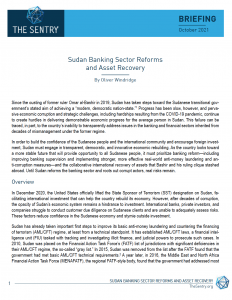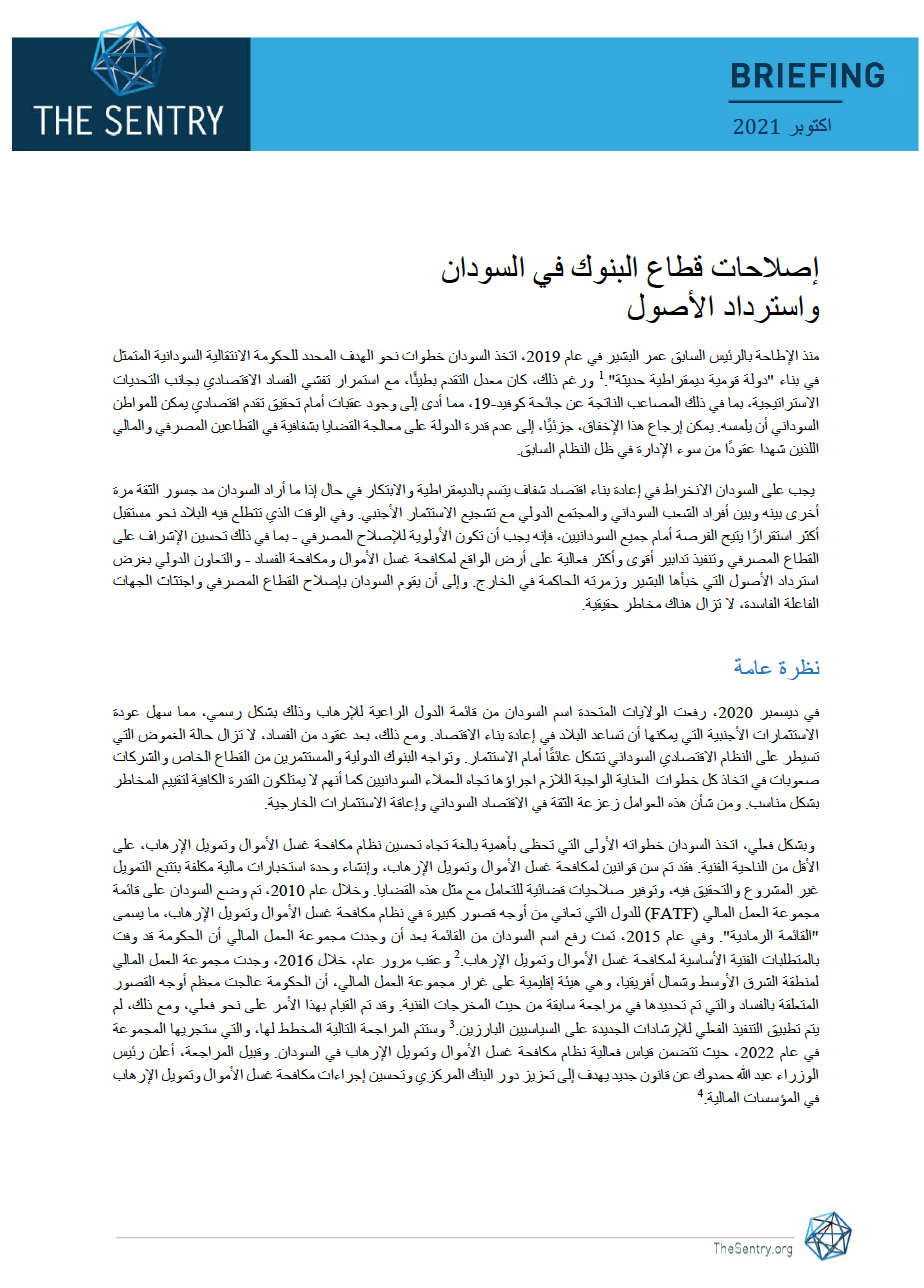 Read the full briefing
Read the full briefing
> اقرأ ملخص وتوصيات المقال بالعربية
Since the ousting of former ruler Omar al-Bashir in 2019, Sudan has taken steps toward the Sudanese transitional government’s stated aim of achieving a “modern, democratic nation-state.”* Progress has been slow, however, and pervasive economic corruption and strategic challenges, including hardships resulting from the COVID-19 pandemic, continue to create hurdles in delivering demonstrable economic progress for the average person in Sudan. This failure can be traced, in part, to the country’s inability to transparently address issues in the banking and financial sectors inherited from decades of mismanagement under the former regime.
In order to build the confidence of the Sudanese people and the international community and encourage foreign investment, Sudan must engage in transparent, democratic, and innovative economic rebuilding. As the country looks toward a more stable future that will provide opportunity to all Sudanese people, it must prioritize banking reform—including improving banking supervision and implementing stronger, more effective real-world anti-money laundering and anti-corruption measures—and the collaborative international recovery of assets that Bashir and his ruling clique stashed abroad. Until Sudan reforms the banking sector and roots out corrupt actors, real risks remain.
Overview
In December 2020, the United States (US) officially lifted the State Sponsor of Terrorism (SST) designation on Sudan, facilitating international investment that can help the country rebuild its economy. However, after decades of corruption, the opacity of Sudan’s economic system remains a hindrance to investment. International banks, private investors, and companies struggle to conduct customer due diligence on Sudanese clients and are unable to adequately assess risks. These factors reduce confidence in the Sudanese economy and stymie outside investment.
Sudan has already taken important first steps to improve its basic anti-money laundering and countering the financing of terrorism (AML/CFT) regime, at least from a technical standpoint. It has established AML/CFT laws, a financial intelligence unit (FIU) tasked with tracking and investigating illicit finance, and judicial powers to prosecute such cases. In 2010, Sudan was placed on the Financial Action Task Force’s (FATF) list of jurisdictions with significant deficiencies in their AML/CFT regime, the so-called “gray list.” In 2015, Sudan was removed from the list after the FATF found that the government had met basic AML/CFT technical requirements.* A year later, in 2016, the Middle East and North Africa Financial Action Task Force (MENAFATF), the regional FATF-style body, found that the government had addressed most corruption-related shortcomings identified in an earlier review in terms of technical output. It did so, however, without measuring actual implementation of new guidelines on politically exposed persons (PEPs).* The next planned review, to be conducted by MENAFATF, will take place in 2022 and will measure the effectiveness of Sudan’s AML/CFT regime. Ahead of the review, Prime Minister Abdalla Hamdok announced a new law aimed at strengthening the Central Bank and improving AML/CFT measures at financial institutions.*
While Sudan has laws on the books intended to curb illicit finance, implementation remains uneven and ineffective, and banking supervision remains weak. Communication and collaboration need to improve across the sector. The Central Bank’s capacity to crack down on corruption is largely untested, but Central Bank leaders have repeatedly promised improvements in banking supervision.* In September 2020, Central Bank Governor Mohamed al-Fatih Zainelabidine vowed to increase anti-money laundering efforts to improve the integrity of Sudan’s banking system.* He stated that the government was focused on much-needed reforms to address the economic crisis, including “exchange rate chaos,” smuggling, and the illicit gold trade.* He reportedly told a World Bank delegation in May 2021 about planned AML/CFT reforms and efforts to restore correspondent bank relationships.* In February 2021, Zainelabidine announced the launch of a dual system allowing both Islamic and non-Islamic borrowing.* However, the Central Bank has been slow to roll out the accompanying regulations and guidelines or provide staff with the required training to put these systems into practice.
In addition to banking sector reforms, Sudan has passed legislation and created units specifically aimed at recovering Bashir-era assets.* One such law establishes a committee tasked with dismantling the Bashir regime, including by dissolving the former ruling National Congress Party (NCP), confiscating its property and assets, and recovering looted resources.* This anti-corruption committee has allowed the government to seize many of the now dissolved NCP’s assets, including its affiliated companies, office buildings, vehicles, and bank accounts.* Four private television channels and newspapers are reportedly among these holdings,* along with the religious charity organization Al-Quran al-Kareem Society’s resources.* All of these assets are said to come from within Sudan. In addition, the committee dissolved the boards of the Khartoum International Airport Company and the Sudan Airports Holding Company over corruption claims.* The committee has been identifying and seizing other Bashir-related assets, including those of alleged Bashir accomplice Abdelbasit Hamza and his companies.* *
Read the full briefing and recommendations>


